
Charles Hardin Holley, known as Buddy Holly, was an American singer and songwriter who was a central and pioneering figure of mid-1950s rock and roll. He was born to a musical family in Lubbock, Texas, during the Great Depression, and learned to play guitar and sing alongside his siblings. Holly's style was influenced by gospel music, country music, and rhythm and blues acts, which he performed in Lubbock with his friends from high school.
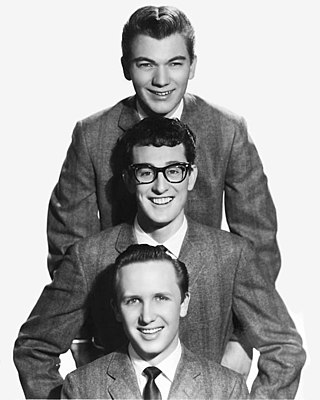
The Crickets were an American rock and roll band from Lubbock, Texas, formed by singer-songwriter Buddy Holly in January 1957. Their first hit record, "That'll Be the Day", released in May 1957, peaked at number three on the Billboard Top 100 chart on September 16, 1957. The sleeve of their first album, The "Chirping" Crickets, shows the band line-up at the time: Holly on lead vocals and lead guitar, Niki Sullivan on rhythm guitar, Jerry Allison on drums, and Joe B. Mauldin on bass. The Crickets helped set the template for subsequent rock bands, such as the Beatles, with their guitar-bass-drums line-up, performing their own material. After Holly's death in 1959, the band continued to tour and record into the 1960s and beyond with other band members through to the 21st century.

"That'll Be the Day" is a song written by Buddy Holly and Jerry Allison. It was first recorded by Buddy Holly and the Three Tunes in 1956 and was re-recorded in 1957 by Holly and his new band, the Crickets. The 1957 recording achieved widespread success. Holly's producer, Norman Petty, was credited as a co-writer, although he did not contribute to the composition.
Bob Montgomery was an American singer, songwriter, record producer and publisher.
Sonny Curtis is an American singer and songwriter. Known for his collaborations with Buddy Holly, he was a member of the Crickets and continued with the band after Holly's death. Curtis's best known compositions include "Walk Right Back", a major hit in 1961 for the Everly Brothers; "I Fought the Law", notably covered by the Bobby Fuller Four and the Clash; and "Love is All Around," the theme song for The Mary Tyler Moore Show.
Niki Sullivan was an American rock and roll guitarist, born in South Gate, California. He was one of the three original members of Buddy Holly's backing band, the Crickets. Though he lost interest within a few months of his involvement, his guitar playing was an integral part of Holly's early success. He performed on 27 of the 32 songs Holly and The Crickets recorded over his brief career. He co-wrote a number of his own songs. In 2012, Sullivan was inducted into the Rock and Roll Hall of Fame as a member of the Crickets by a special committee, aimed at correcting the mistake of not including the Crickets with Buddy Holly when he was first inducted in 1986.

Sentimentally Yours is the third studio album by American country music singer Patsy Cline, released August 6, 1962. The album was the final studio album Cline would release before her death in a plane crash less than a year later.

Patsy Cline's Greatest Hits is a compilation consisting of American country pop music singer, Patsy Cline's greatest hits. The album consists of Cline's biggest hits between 1957 and 1963. It is one of the biggest-selling albums in the United States by any female country music artist.
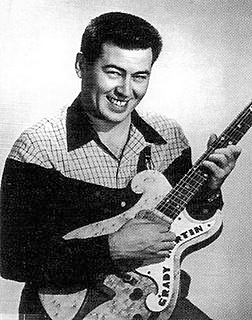
Thomas Grady Martin was an American session guitarist in country music and rockabilly.

That'll Be The Day is the second and final studio album from Buddy Holly. Decca, Holly's first major record label, after failing to produce a hit single from Holly's early recordings, packaged these 1956 tunes after he had some success with recordings from the Brunswick and Coral labels, especially the previously released single "That'll Be the Day". This is the last album released before his death in a plane crash on February 3, 1959, and is rare among collectors.
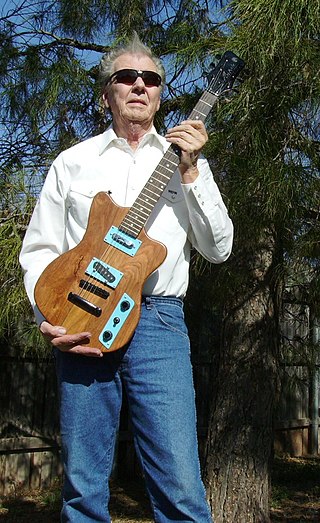
Joseph Sonny West was an American songwriter and musician, best known as the co-writer of two of Buddy Holly's biggest hits: "Oh, Boy!" and "Rave On".
The Picks was an American vocal quartet that backed Buddy Holly and the Crickets' band on nine of the first twelve Crickets releases on Brunswick in 1957, as well as backing Buddy Holly solos for group sounds. The original members were John Pickering (lead), Bill Pickering (tenor), and Bob Lapham (baritone).
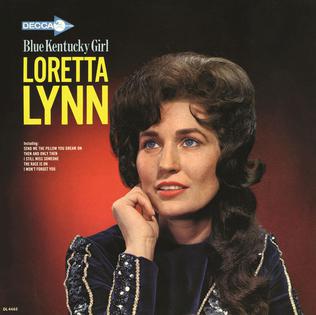
Blue Kentucky Girl is the fourth studio album by American country music singer-songwriter Loretta Lynn. It was released on June 14, 1965, by Decca Records.
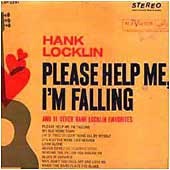
Please Help Me, I'm Falling is the title of a recording by American country music singer Hank Locklin, released in 1960. It marks Locklin's first release considered part of the Nashville Sound.

Patsy Cline is an EP released by American country music singer, Patsy Cline on August 14, 1961. It Cline's third EP to be released.

Memorial Collection is a 2009 compilation album of American singer–songwriter and rock and roll pioneer Buddy Holly's master takes and hit singles, including some rare recordings. Along with Down the Line: Rarities, this album was released to commemorate the 50th anniversary of Holly's death.

Brenda Lee is the second studio album by American singer Brenda Lee. The album was released August 1, 1960 on Decca Records and was produced by Owen Bradley. The album's second single "Sweet Nothin's" became Lee's first major hit single on the Billboard Hot 100, peaking within the Top 10. This was followed by the third single "I'm Sorry" released the following year that became her first single to top the Billboard Hot 100.

This Is...Brenda is the third studio album by American singer Brenda Lee. The album was released on October 10, 1960, on Decca Records and was produced by Owen Bradley. The release was Brenda Lee's second studio album released during 1960 and contained the single "I Want to Be Wanted", which became a number one single on the Billboard Hot 100.

Reminiscing is a compilation album by American singer-songwriter Buddy Holly. The album was released as an LP record in both mono and stereo formats in February 1963. Reminiscing was Buddy Holly's third posthumously released album and the second album to feature previously unreleased material. The original recordings were overdubbed by the Fireballs in 1962 and many of the undubbed recordings appeared on For the First Time Anywhere in 1983.
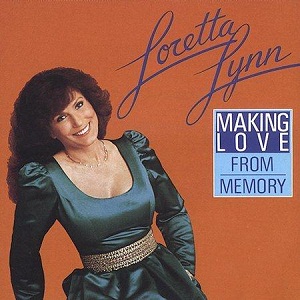
Making Love from Memory is the thirty-fifth solo studio album by American country music singer-songwriter Loretta Lynn. It was released on September 6, 1982, by MCA Records. This was Lynn's only album to not chart on the Billboard Top Country Albums chart during her time at Decca/MCA.
















